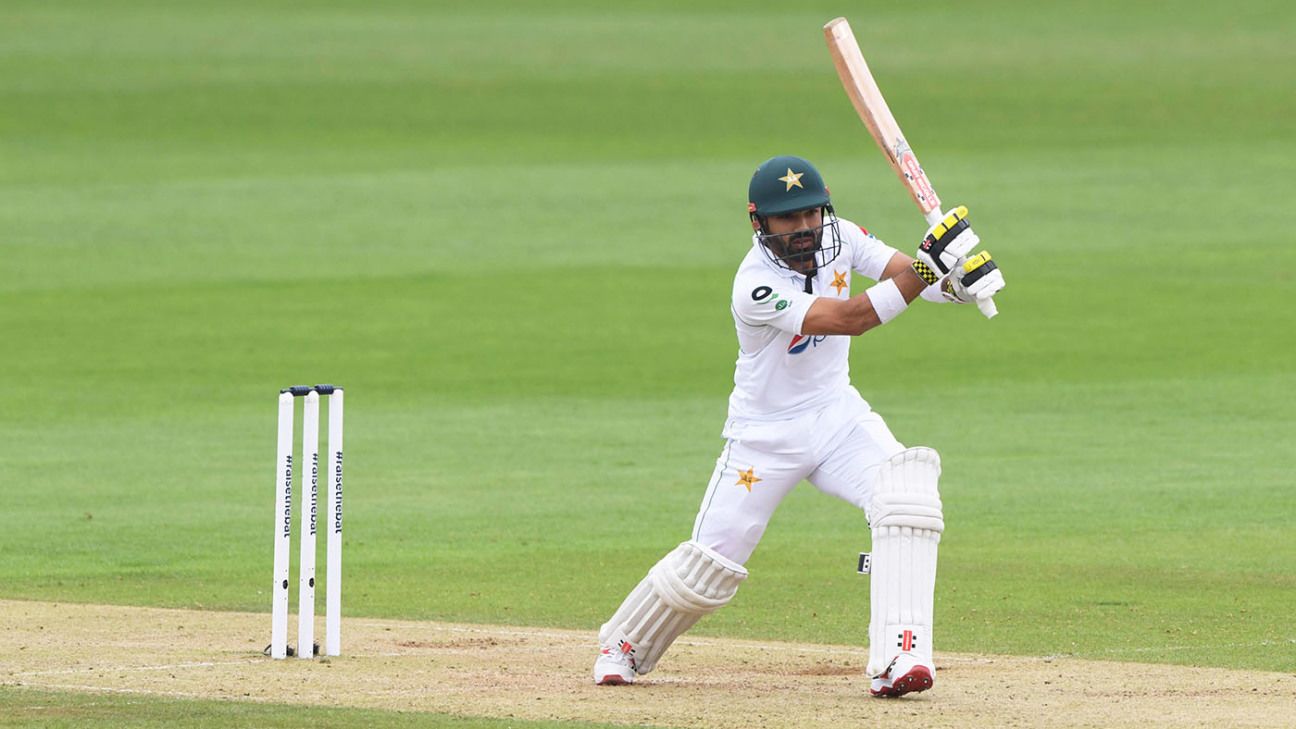
England might feel they have had the better of two truncated days in Southampton, reducing Pakistan to 223 for 9 after the visitors had won the toss and opted to bat. But wicketkeeper Mohammad Rizwan dismissed the idea Pakistan were up against it, saying their seamers had showed what they were capable of at Old Trafford, and would test England here in "seaming conditions the likes of which I have never seen" before.
"They were difficult conditions, not too dissimilar to some of the wickets in the north in Pakistan," Rizwan said. "Places like Abbottabad and Peshawar, particularly. But this was the first time in my career I saw the ball seam after 75 overs, right until they took the new ball. I've never seen anything like it before. It'll be very difficult for England, too. They won't find batting easy."
It feels strange to say Rizwan was under any pressure coming into this test, and from within the team management, that might never have been the case. His glovework at Old Trafford was inspired, as evidenced by a few excellent catches keeping up to Yasir Shah, who at times turned the ball square. He was unafraid of standing up to the 80mph Mohammad Abbas to keep England's batsman honest when they strayed out of the crease, never in the slightest appearing out of his depth.
ALSO READ: Alam and the cruelty of batting: 10-year wait ends in a duck
But two failures with the bat, combined by the somewhat intimidating presence of former Pakistan captain Sarfaraz Ahmed waiting in the wings as back-up, led to questions about whether Ahmed might not be the safer choice, particularly with bat in hand. As such, Rizwan may have felt the need to showcase his ability when he walked out to bat alongside Babar Azam in Southampton, and after negotiating a torturously difficult first hour during which runs seemed a distant dream, the 27-year old began to grow into the role.
"When we had Babar with me, I was being compact," he said. "But when he got out and the tail came in, I knew I would have to go searching for the runs. In this format, you have these phases. At times, you have to stay calm and work hard to preserve your wicket. It would be silly to throw your wicket away when you have Babar alongside you, but the situation changed when he got out. When the tail came in, I attacked, and that worked out very nicely.
"This was a new experience for me. When I play domestic cricket, I bat in the top five, so here, batting with the tail was a learning process for me. When we were coming on and off [due to rain and bad light], I spoke to Misbah[-ul-Haq] and Younis [Khan], and they gave me plenty of advice on how to play. But to negotiate the situation batting with the tail, and how to build up the innings for myself and the team, is very much a learning process and this was a good start."
It was the partnership with Mohammad Abbas that especially spruced up Rizwan's outlook. After Pakistan crumbled to 176 for 8, Shaheen Afridi falling to some characteristically tailender running, even 200 seemed a distant prospect. Rizwan started farming the strike, and as England spread the field, he found the stifling pressure lift. Aided by some dodgy tactics from England, particularly around allowing too many loose singles later on in overs, he struck up a breezy 39-run partnership with Abbas, bringing up his half-century along the way.
"We have fought back and our position is decent," Rizwan said. "If we add 30-40 runs, we have lots of chances. Even if we don't, and get them out within our own score, the match is on. You look at our bowlers, and they did the job for us in Manchester. England had the fortune on that final day, but our bowlers did a very good job. We expect them to repeat that here, given the ball seamed all the time for England. They had a bit of good fortune in that when we kept coming off, they got a bit of rest between their spells, allowing them to bowl longer spells. But our bowlers are young and capable, and we expect to contain them to within our total."
For all of Rizwan's talk about the team, this was a deeply personal innings. Some of the criticism flung his way following the first Test was ill-judged at best and spiteful at worst, not to mention being well wide of the mark. But in Pakistan cricket, what people say about players matters a great deal, and for all the brilliance Rizwan showed with the gloves, wicketkeeping, like perhaps umpiring, is often only noticed when done poorly. Rizwan needed a contribution with the bat to completely silence those who questioned his place in the team.
"I don't care about my critics," Rizwan said. "I don't listen to any of them. I see the cricket ground in front of my eyes and I know what I have to do in the nets. I work hard and leave the rest up to God. I don't even read the news or watch TV. I keep working hard, and hope that what I'm doing produces results. That's all I know how to do."
Rizwan's story has been one of excelling where no one can see him. He toiled away in domestic cricket for years, clocking up first-class runs - nearly 4700 of them at 42.58 - which no one really watched beyond grainy YouTube feeds accumulated from the few occasions the PCB had a couple of cameras at the ground. All people saw, however, was Ahmed lead the side form strength to strength in international cricket; he was so obviously the first-choice wicketkeeper Pakistan didn't even take a reserve to England for the World Cup last year.
In the Manchester Test, Rizwan continued his progress by demonstrating he was fit for his primary role, and kept wickets immaculately. All people noticed, though, was the lack of footwork when he had bat in hand, and the scorecard, which showed he had managed just 36 in two innings.
While his quality behind the stumps has never been in question, this might have been the day Rizwan demonstrated he is a half-decent cricketer in front of them, as well. He remains unbeaten, and not just on the overnight scorecard.















 Phone: (800) 737. 6040
Phone: (800) 737. 6040 Fax: (800) 825 5558
Fax: (800) 825 5558 Website:
Website:  Email:
Email: 






